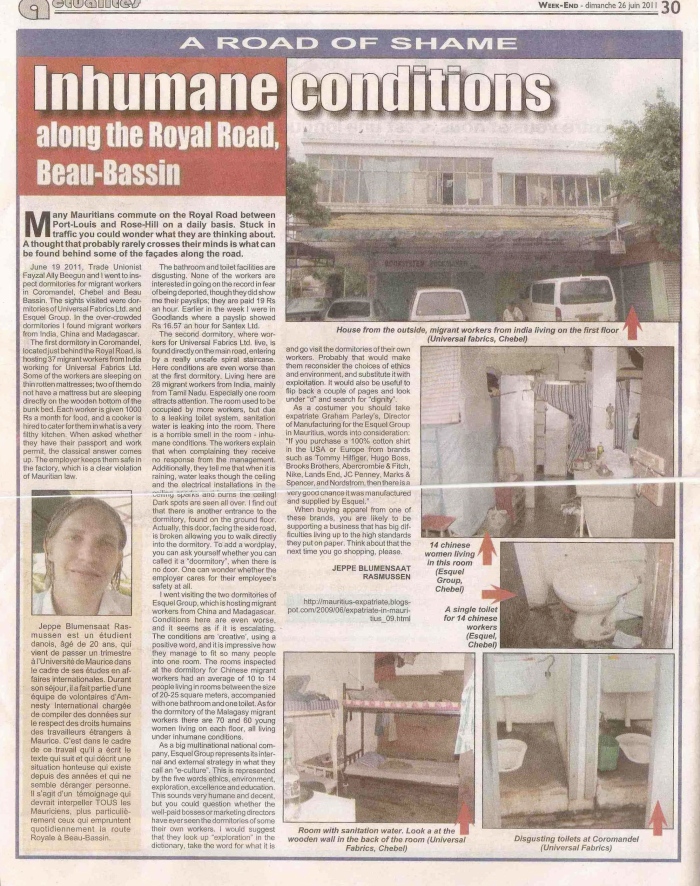Posts Tagged ‘JC Penney’
A Road of Shame
Inhumane conditions along the Royal Road, Beau Bassin!
Many Mauritians commute on the Royal Road between Port-Louis and Rose Hill on a daily basis. Stuck in traffic you could wonder what they are thinking about. A thought that probably rarely crosses their minds is what can be found behind some of the façades along the road. Amnesty International Mauritius Section went to discover.
June 19 2011, Amnesty International Mauritius Section, together with trade unionist Fayzal Ally Beegun, went to inspect dormitories for migrant workers in Coromandel, Chebel and Beau Bassin. The sights visited were dormitories of Universal Fabrics Ltd. and Esquel Group. In the over-crowded dormitories we found migrant workers from India, China and Madagascar.
The first dormitory in Coromandel, located just behind the Royal Road, is hosting 37 Indian migrant workers working for Universal Fabrics Ltd. Some of the workers are sleeping on thin rotten mattresses; two of them do not have a mattress but are sleeping directly on the wooden bottom of the bunk bed. Each worker is given 1000 Rs (£22) a month for food, and a cooker is hired to cater for them in what is a very filthy kitchen. When asked whether they have their passport and worker permit, the classical answer comes up. The employer keeps them safe in the factory, which is a clear violation of Mauritian law. The bathroom and toilet facilities are disgusting. None of the workers are interested in going on the record in fear of being deported, though they did show us their payslips; they are paid 19 Rs (£0.42) an hour.

The door-less entrance and the home of a Chinese Migrant worker: 1 x 1 x 1,80 meters.
The second dormitory, where workers for Universal Fabrics Ltd. live, is found directly on the main road, entering by a really unsafe spiral staircase. Here conditions are even worse than at the first dormitory. Living here are 28 Indian migrant workers, mainly from Tamil Nadu. Especially one room attracts attention. The room used to be occupied by more workers, but due to a leaking toilet system, sanitation water is leaking into the room. There is a horrible smell in the room – inhumane conditions. The workers explain that when complaining they receive no response from the management. Additionally, they tell us that when it is raining water leaks though the ceiling and the electrical installations in the ceiling sparks and burns the ceiling! Dark spots are seen all over. We find out that there is another entrance to the dormitory, found on the ground floor. Actually, this door, facing the side road, is broken allowing you to walk directly into the dormitory. One can wonder whether the employer cares for their employee’s safety at all.
We went visiting the two dormitories of Esquel Group, which is hosting migrant workers from China and Madagascar. Conditions here are even worse, and it seems as if it is escalating. The conditions are ‘creative’, using a positive word, and it is impressive how they manage to fit so many people into one room. The rooms inspected at the Chinese dormitory had an average of 10 to 14 people living in rooms between the size of 20-25 square meters, accompanied with one bathroom and one toilet. As for the Malagasy dormitory there are 70 and 60 young women living on each floor, all living under inhumane conditions.
Esquel Group’s five E’s – is there a sixth one missing?
As a big multinational national company, Esquel Group represents its internal and external strategy in what they call an “e-culture”. This is represented by the five words ethics, environment, exploration, excellence and education. This sounds very humane and decent, but you could question whether the well-paid bosses or marketing directors have ever seen the dormitories of some their own workers. I would suggest that they look up “exploitation” in the dictionary, take the word for what it is and go visit the dormitories of their own workers. Probably that would make them reconsider the choices of ethics and environment, and substitute it with exploitation. It would also be useful to flip back a couple of pages and look under “d” and search for “dignity”.
As a costumer you should take expatriate Graham Parley’s, Director of Manufacturing for the Esquel Group in Mauritius, words into consideration: “If you purchase a 100% cotton shirt in the USA or Europe from brands such as Tommy Hilfiger, Hugo Boss, Brooks Brothers, Abercrombie & Fitch, Nike, Lands End, JC Penney, Marks & Spencer, and Nordstrom, then there is a very good chance it was manufactured and supplied by Esquel.”(1) When buying apparel from one of these brands, you are likely to be supporting a business that has big difficulties living up to the high standards they put on paper. Think about that the next time you go shopping, please.
(1) http://mauritius-expatriate.blogspot.com/2009/06/expatriate-in-mauritius_09.html
